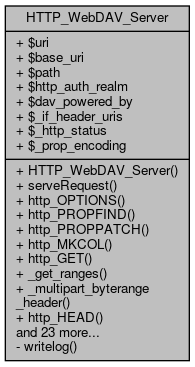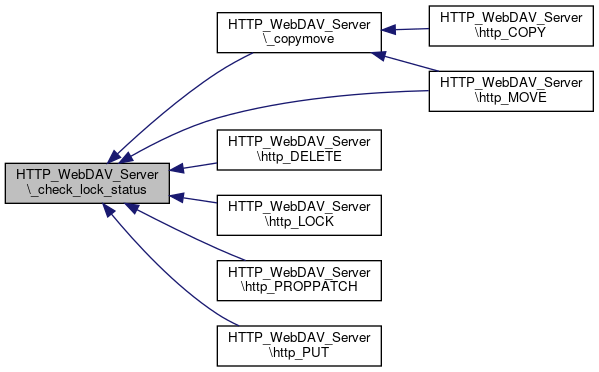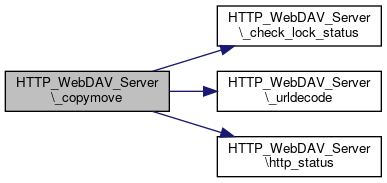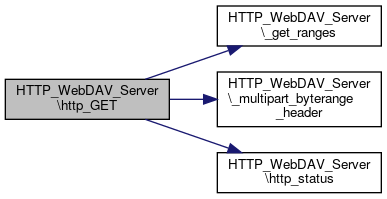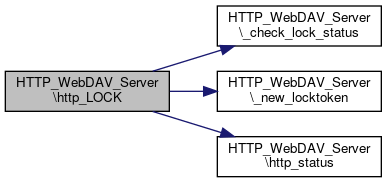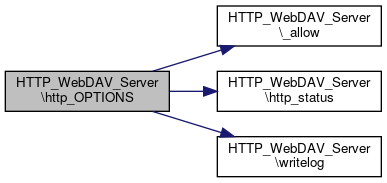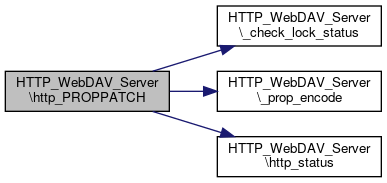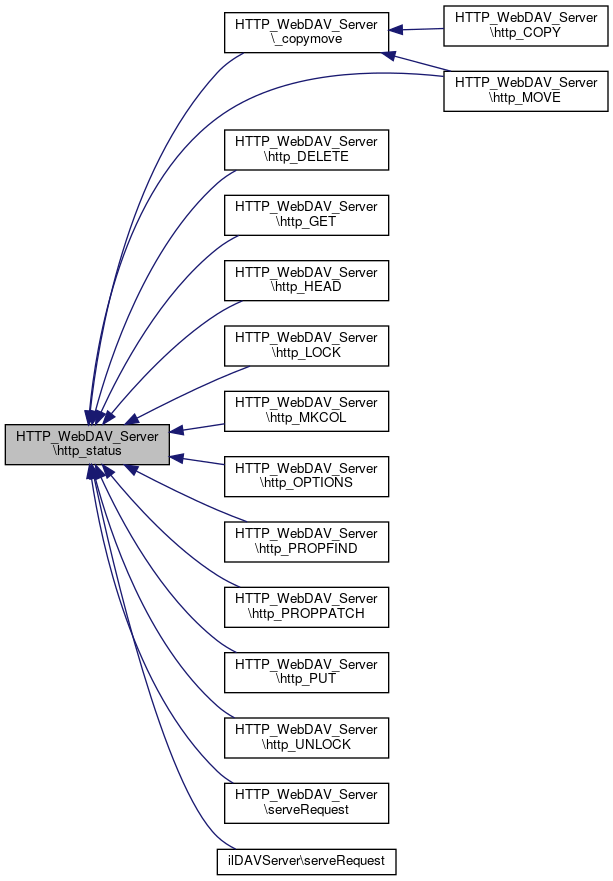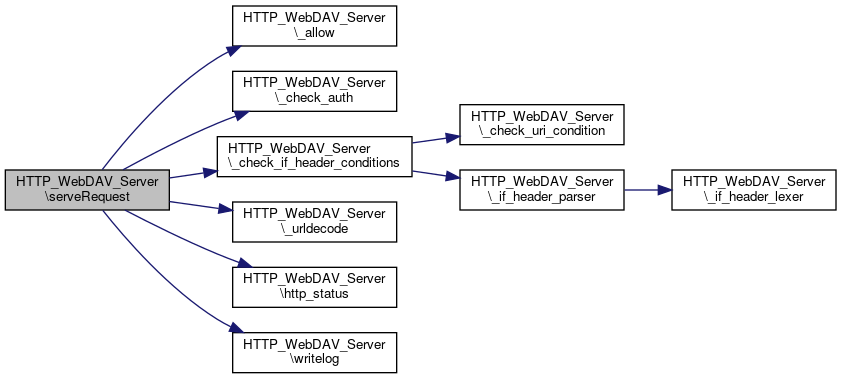 Inheritance diagram for HTTP_WebDAV_Server:
Inheritance diagram for HTTP_WebDAV_Server: Collaboration diagram for HTTP_WebDAV_Server:
Collaboration diagram for HTTP_WebDAV_Server:Public Member Functions | |
| HTTP_WebDAV_Server () | |
| Constructor. More... | |
| serveRequest () | |
| Serve WebDAV HTTP request. More... | |
| http_OPTIONS () | |
| GET implementation. More... | |
| http_PROPFIND () | |
| PROPFIND method handler. More... | |
| http_PROPPATCH () | |
| PROPPATCH method handler. More... | |
| http_MKCOL () | |
| MKCOL method handler. More... | |
| http_GET () | |
| GET method handler. More... | |
| _get_ranges (&$options) | |
| parse HTTP Range: header More... | |
| _multipart_byterange_header ($mimetype=false, $from=false, $to=false, $total=false) | |
| generate separator headers for multipart response More... | |
| http_HEAD () | |
| HEAD method handler. More... | |
| http_PUT () | |
| PUT method handler. More... | |
| http_DELETE () | |
| DELETE method handler. More... | |
| http_COPY () | |
| COPY method handler. More... | |
| http_MOVE () | |
| MOVE method handler. More... | |
| http_LOCK () | |
| LOCK method handler. More... | |
| http_UNLOCK () | |
| UNLOCK method handler. More... | |
| _copymove ($what) | |
| _allow () | |
| check for implemented HTTP methods More... | |
| mkprop () | |
| helper for property element creation More... | |
| _check_auth () | |
| check authentication if check is implemented More... | |
| _new_uuid () | |
| generate Unique Universal IDentifier for lock token More... | |
| _new_locktoken () | |
| create a new opaque lock token as defined in RFC2518 More... | |
| _if_header_lexer ($string, &$pos) | |
| _if_header_parser ($str) | |
| parse If: header More... | |
| _check_if_header_conditions () | |
| check if conditions from "If:" headers are meat More... | |
| _check_uri_condition ($uri, $condition) | |
| Check a single URI condition parsed from an if-header. More... | |
| _check_lock_status ($path, $exclusive_only=false) | |
| lockdiscovery ($path) | |
| Generate lockdiscovery reply from checklock() result. More... | |
| http_status ($status) | |
| set HTTP return status and mirror it in a private header More... | |
| _urlencode ($url) | |
| private minimalistic version of PHP urlencode() More... | |
| _urldecode ($path) | |
| private version of PHP urldecode More... | |
| _prop_encode ($text) | |
| UTF-8 encode property values if not already done so. More... | |
| _slashify ($path) | |
| Slashify - make sure path ends in a slash. More... | |
Data Fields | |
| $uri | |
| $base_uri | |
| $path | |
| $http_auth_realm = "PHP WebDAV" | |
| $dav_powered_by = "" | |
| $_if_header_uris = array() | |
| $_http_status = "200 OK" | |
| $_prop_encoding = "utf-8" | |
Private Member Functions | |
| writelog ($message) | |
| Writes a message to the logfile.,. More... | |
Detailed Description
Definition at line 37 of file Server.php.
Member Function Documentation
◆ _allow()
| HTTP_WebDAV_Server::_allow | ( | ) |
check for implemented HTTP methods
- Parameters
-
void
- Returns
- array something
Definition at line 1507 of file Server.php.
Referenced by http_OPTIONS(), and serveRequest().
 Here is the caller graph for this function:
Here is the caller graph for this function:◆ _check_auth()
| HTTP_WebDAV_Server::_check_auth | ( | ) |
check authentication if check is implemented
- Parameters
-
void
- Returns
- bool true if authentication succeded or not necessary
Definition at line 1569 of file Server.php.
Referenced by serveRequest().
 Here is the caller graph for this function:
Here is the caller graph for this function:◆ _check_if_header_conditions()
| HTTP_WebDAV_Server::_check_if_header_conditions | ( | ) |
check if conditions from "If:" headers are meat
the "If:" header is an extension to HTTP/1.1 defined in RFC 2518 section 9.4
- Parameters
-
void
- Returns
- void
Definition at line 1782 of file Server.php.
References $uri, _check_uri_condition(), and _if_header_parser().
Referenced by serveRequest().
 Here is the call graph for this function:
Here is the call graph for this function: Here is the caller graph for this function:
Here is the caller graph for this function:◆ _check_lock_status()
| HTTP_WebDAV_Server::_check_lock_status | ( | $path, | |
$exclusive_only = false |
|||
| ) |
- Parameters
-
string path of resource to check bool exclusive lock?
Definition at line 1843 of file Server.php.
Referenced by _copymove(), http_DELETE(), http_LOCK(), http_MOVE(), http_PROPPATCH(), and http_PUT().
 Here is the caller graph for this function:
Here is the caller graph for this function:◆ _check_uri_condition()
| HTTP_WebDAV_Server::_check_uri_condition | ( | $uri, | |
| $condition | |||
| ) |
Check a single URI condition parsed from an if-header.
Check a single URI condition parsed from an if-header
- Parameters
-
string $uri URI to check string $condition Condition to check for this URI
- Returns
- bool Condition check result
Definition at line 1829 of file Server.php.
Referenced by _check_if_header_conditions().
 Here is the caller graph for this function:
Here is the caller graph for this function:◆ _copymove()
| HTTP_WebDAV_Server::_copymove | ( | $what | ) |
Definition at line 1444 of file Server.php.
References $options, $path, _check_lock_status(), _urldecode(), and http_status().
Referenced by http_COPY(), and http_MOVE().
 Here is the call graph for this function:
Here is the call graph for this function: Here is the caller graph for this function:
Here is the caller graph for this function:◆ _get_ranges()
| HTTP_WebDAV_Server::_get_ranges | ( | & | $options | ) |
parse HTTP Range: header
- Parameters
-
array options array to store result in
- Returns
- void
Definition at line 986 of file Server.php.
References $options.
Referenced by http_GET().
 Here is the caller graph for this function:
Here is the caller graph for this function:◆ _if_header_lexer()
| HTTP_WebDAV_Server::_if_header_lexer | ( | $string, | |
| & | $pos | ||
| ) |
- Parameters
-
string header string to parse int current parsing position
- Returns
- array next token (type and value)
Definition at line 1643 of file Server.php.
Referenced by _if_header_parser().
 Here is the caller graph for this function:
Here is the caller graph for this function:◆ _if_header_parser()
| HTTP_WebDAV_Server::_if_header_parser | ( | $str | ) |
parse If: header
- Parameters
-
string header string
- Returns
- array URIs and their conditions
Definition at line 1697 of file Server.php.
References $uri, and _if_header_lexer().
Referenced by _check_if_header_conditions().
 Here is the call graph for this function:
Here is the call graph for this function: Here is the caller graph for this function:
Here is the caller graph for this function:◆ _multipart_byterange_header()
| HTTP_WebDAV_Server::_multipart_byterange_header | ( | $mimetype = false, |
|
$from = false, |
|||
$to = false, |
|||
$total = false |
|||
| ) |
generate separator headers for multipart response
first and last call happen without parameters to generate the initial header and closing sequence, all calls inbetween require content mimetype, start and end byte position and optionaly the total byte length of the requested resource
- Parameters
-
string mimetype int start byte position int end byte position int total resource byte size
Definition at line 1020 of file Server.php.
References $total.
Referenced by http_GET().
 Here is the caller graph for this function:
Here is the caller graph for this function:◆ _new_locktoken()
| HTTP_WebDAV_Server::_new_locktoken | ( | ) |
create a new opaque lock token as defined in RFC2518
- Parameters
-
void
- Returns
- string new RFC2518 opaque lock token
Definition at line 1627 of file Server.php.
Referenced by http_LOCK().
 Here is the caller graph for this function:
Here is the caller graph for this function:◆ _new_uuid()
| HTTP_WebDAV_Server::_new_uuid | ( | ) |
generate Unique Universal IDentifier for lock token
- Parameters
-
void
- Returns
- string a new UUID
Definition at line 1597 of file Server.php.
References $n.
◆ _prop_encode()
| HTTP_WebDAV_Server::_prop_encode | ( | $text | ) |
UTF-8 encode property values if not already done so.
- Parameters
-
string text to encode
- Returns
- string utf-8 encoded text
Definition at line 1980 of file Server.php.
Referenced by http_PROPFIND(), and http_PROPPATCH().
 Here is the caller graph for this function:
Here is the caller graph for this function:◆ _slashify()
| HTTP_WebDAV_Server::_slashify | ( | $path | ) |
Slashify - make sure path ends in a slash.
- Parameters
-
string directory path
- Returns
- string directory path wiht trailing slash
Definition at line 1999 of file Server.php.
References $path.
◆ _urldecode()
| HTTP_WebDAV_Server::_urldecode | ( | $path | ) |
private version of PHP urldecode
not really needed but added for completenes
- Parameters
-
string URL to decode
- Returns
- string decoded URL
Definition at line 1962 of file Server.php.
References $result.
Referenced by _copymove(), and serveRequest().
 Here is the caller graph for this function:
Here is the caller graph for this function:◆ _urlencode()
| HTTP_WebDAV_Server::_urlencode | ( | $url | ) |
private minimalistic version of PHP urlencode()
only blanks and XML special chars must be encoded here full urlencode() encoding confuses some clients ...
- Parameters
-
string URL to encode
- Returns
- string encoded URL
Definition at line 1945 of file Server.php.
◆ http_COPY()
| HTTP_WebDAV_Server::http_COPY | ( | ) |
COPY method handler.
- Parameters
-
void
- Returns
- void
Definition at line 1263 of file Server.php.
References _copymove().
 Here is the call graph for this function:
Here is the call graph for this function:◆ http_DELETE()
| HTTP_WebDAV_Server::http_DELETE | ( | ) |
DELETE method handler.
- Parameters
-
void
- Returns
- void
Definition at line 1228 of file Server.php.
References $options, $path, _check_lock_status(), and http_status().
 Here is the call graph for this function:
Here is the call graph for this function:◆ http_GET()
| HTTP_WebDAV_Server::http_GET | ( | ) |
GET method handler.
- Parameters
-
void
- Returns
- void
Definition at line 851 of file Server.php.
References $options, $path, $size, $total, _get_ranges(), _multipart_byterange_header(), exit, and http_status().
 Here is the call graph for this function:
Here is the call graph for this function:◆ http_HEAD()
| HTTP_WebDAV_Server::http_HEAD | ( | ) |
HEAD method handler.
- Parameters
-
void
- Returns
- void
Definition at line 1059 of file Server.php.
References $options, $path, and http_status().
 Here is the call graph for this function:
Here is the call graph for this function:◆ http_LOCK()
| HTTP_WebDAV_Server::http_LOCK | ( | ) |
LOCK method handler.
- Parameters
-
void
- Returns
- void
Definition at line 1303 of file Server.php.
References $options, $path, _check_lock_status(), _new_locktoken(), and http_status().
 Here is the call graph for this function:
Here is the call graph for this function:◆ http_MKCOL()
| HTTP_WebDAV_Server::http_MKCOL | ( | ) |
MKCOL method handler.
- Parameters
-
void
- Returns
- void
Definition at line 830 of file Server.php.
References $options, $path, and http_status().
 Here is the call graph for this function:
Here is the call graph for this function:◆ http_MOVE()
| HTTP_WebDAV_Server::http_MOVE | ( | ) |
MOVE method handler.
- Parameters
-
void
- Returns
- void
Definition at line 1280 of file Server.php.
References _check_lock_status(), _copymove(), and http_status().
 Here is the call graph for this function:
Here is the call graph for this function:◆ http_OPTIONS()
| HTTP_WebDAV_Server::http_OPTIONS | ( | ) |
GET implementation.
overload this method to retrieve resources from your server
- Parameters
-
array &$params Array of input and output parameters
input- path -
output- size -
- Returns
- int HTTP-Statuscode PUT implementation
PUT implementation
- Parameters
-
array &$params
- Returns
- int HTTP-Statuscode COPY implementation
COPY implementation
- Parameters
-
array &$params
- Returns
- int HTTP-Statuscode MOVE implementation
MOVE implementation
- Parameters
-
array &$params
- Returns
- int HTTP-Statuscode DELETE implementation
DELETE implementation
- Parameters
-
array &$params
- Returns
- int HTTP-Statuscode PROPFIND implementation
PROPFIND implementation
- Parameters
-
array &$params
- Returns
- int HTTP-Statuscode PROPPATCH implementation
PROPPATCH implementation
- Parameters
-
array &$params
- Returns
- int HTTP-Statuscode LOCK implementation
LOCK implementation
- Parameters
-
array &$params
- Returns
- int HTTP-Statuscode UNLOCK implementation
UNLOCK implementation
- Parameters
-
array &$params
- Returns
- int HTTP-Statuscode check authentication
overload this method to retrieve and confirm authentication information
- Parameters
-
string type Authentication type, e.g. "basic" or "digest" string username Transmitted username string passwort Transmitted password
- Returns
- bool Authentication status check lock status for a resource
overload this method to return shared and exclusive locks active for this resource
- Parameters
-
string resource Resource path to check
- Returns
- array An array of lock entries each consisting of 'type' ('shared'/'exclusive'), 'token' and 'timeout' OPTIONS method handler
The OPTIONS method handler creates a valid OPTIONS reply including Dav: and Allowed: headers based on the implemented methods found in the actual instance
- Parameters
-
void
- Returns
- void
Definition at line 478 of file Server.php.
References _allow(), http_status(), and writelog().
 Here is the call graph for this function:
Here is the call graph for this function:◆ http_PROPFIND()
| HTTP_WebDAV_Server::http_PROPFIND | ( | ) |
PROPFIND method handler.
- Parameters
-
void
- Returns
- void
Definition at line 512 of file Server.php.
References $file, $options, $path, _prop_encode(), http_status(), lockdiscovery(), and mkprop().
 Here is the call graph for this function:
Here is the call graph for this function:◆ http_PROPPATCH()
| HTTP_WebDAV_Server::http_PROPPATCH | ( | ) |
PROPPATCH method handler.
- Parameters
-
void
- Returns
- void
Definition at line 773 of file Server.php.
References $options, $path, _check_lock_status(), _prop_encode(), and http_status().
 Here is the call graph for this function:
Here is the call graph for this function:◆ http_PUT()
| HTTP_WebDAV_Server::http_PUT | ( | ) |
PUT method handler.
- Parameters
-
void
- Returns
- void
Definition at line 1089 of file Server.php.
References $options, $path, _check_lock_status(), and http_status().
 Here is the call graph for this function:
Here is the call graph for this function:◆ http_status()
| HTTP_WebDAV_Server::http_status | ( | $status | ) |
set HTTP return status and mirror it in a private header
- Parameters
-
string status code and message
- Returns
- void
Definition at line 1920 of file Server.php.
Referenced by _copymove(), http_DELETE(), http_GET(), http_HEAD(), http_LOCK(), http_MKCOL(), http_MOVE(), http_OPTIONS(), http_PROPFIND(), http_PROPPATCH(), http_PUT(), http_UNLOCK(), serveRequest(), and ilDAVServer\serveRequest().
 Here is the caller graph for this function:
Here is the caller graph for this function:◆ http_UNLOCK()
| HTTP_WebDAV_Server::http_UNLOCK | ( | ) |
UNLOCK method handler.
- Parameters
-
void
- Returns
- void
Definition at line 1418 of file Server.php.
References $options, $path, and http_status().
 Here is the call graph for this function:
Here is the call graph for this function:◆ HTTP_WebDAV_Server()
| HTTP_WebDAV_Server::HTTP_WebDAV_Server | ( | ) |
Constructor.
- Parameters
-
void
Definition at line 108 of file Server.php.
Referenced by ilDAVServer\ilDAVServer().
 Here is the caller graph for this function:
Here is the caller graph for this function:◆ lockdiscovery()
| HTTP_WebDAV_Server::lockdiscovery | ( | $path | ) |
Generate lockdiscovery reply from checklock() result.
- Parameters
-
string resource path to check
- Returns
- string lockdiscovery response
Definition at line 1872 of file Server.php.
Referenced by http_PROPFIND().
 Here is the caller graph for this function:
Here is the caller graph for this function:◆ mkprop()
| HTTP_WebDAV_Server::mkprop | ( | ) |
helper for property element creation
- Parameters
-
string XML namespace (optional) string property name string property value
- Returns
- array property array
Definition at line 1547 of file Server.php.
Referenced by ilDAVServer\fileinfo(), and http_PROPFIND().
 Here is the caller graph for this function:
Here is the caller graph for this function:◆ serveRequest()
| HTTP_WebDAV_Server::serveRequest | ( | ) |
Serve WebDAV HTTP request.
dispatch WebDAV HTTP request to the apropriate method handler
- Parameters
-
void
- Returns
- void
Definition at line 125 of file Server.php.
References $uri, _allow(), _check_auth(), _check_if_header_conditions(), _urldecode(), http_status(), and writelog().
 Here is the call graph for this function:
Here is the call graph for this function:◆ writelog()
|
private |
Writes a message to the logfile.,.
- Parameters
-
message String.
- Returns
- void.
Definition at line 2012 of file Server.php.
Referenced by http_OPTIONS(), and serveRequest().
 Here is the caller graph for this function:
Here is the caller graph for this function:Field Documentation
◆ $_http_status
| HTTP_WebDAV_Server::$_http_status = "200 OK" |
Definition at line 90 of file Server.php.
◆ $_if_header_uris
| HTTP_WebDAV_Server::$_if_header_uris = array() |
Definition at line 83 of file Server.php.
◆ $_prop_encoding
| HTTP_WebDAV_Server::$_prop_encoding = "utf-8" |
Definition at line 97 of file Server.php.
◆ $base_uri
| HTTP_WebDAV_Server::$base_uri |
Definition at line 54 of file Server.php.
◆ $dav_powered_by
| HTTP_WebDAV_Server::$dav_powered_by = "" |
Definition at line 76 of file Server.php.
◆ $http_auth_realm
| HTTP_WebDAV_Server::$http_auth_realm = "PHP WebDAV" |
Definition at line 69 of file Server.php.
◆ $path
| HTTP_WebDAV_Server::$path |
Definition at line 62 of file Server.php.
Referenced by _copymove(), _slashify(), ilDAVServer\checkLock(), ilDAVServer\davBasename(), ilDAVServer\davDeslashify(), ilDAVServer\davUrlEncode(), ilDAVServer\DELETE(), ilDAVServer\GET(), ilDAVServer\getDir(), http_DELETE(), http_GET(), http_HEAD(), http_LOCK(), http_MKCOL(), http_PROPFIND(), http_PROPPATCH(), http_PUT(), http_UNLOCK(), ilDAVServer\LOCK(), ilDAVServer\MKCOL(), ilDAVServer\mountDir(), ilDAVServer\PROPFIND(), ilDAVServer\PROPPATCH(), ilDAVServer\PUT(), ilDAVServer\showMountInstructions(), and ilDAVServer\UNLOCK().
◆ $uri
| HTTP_WebDAV_Server::$uri |
Definition at line 46 of file Server.php.
Referenced by _check_if_header_conditions(), _if_header_parser(), ilDAVServer\getFileURI(), ilDAVServer\getFolderURI(), ilDAVServer\getMountURI(), ilDAVServer\getObjectURI(), and serveRequest().
The documentation for this class was generated from the following file:
- Services/WebDAV/classes/Server.php

